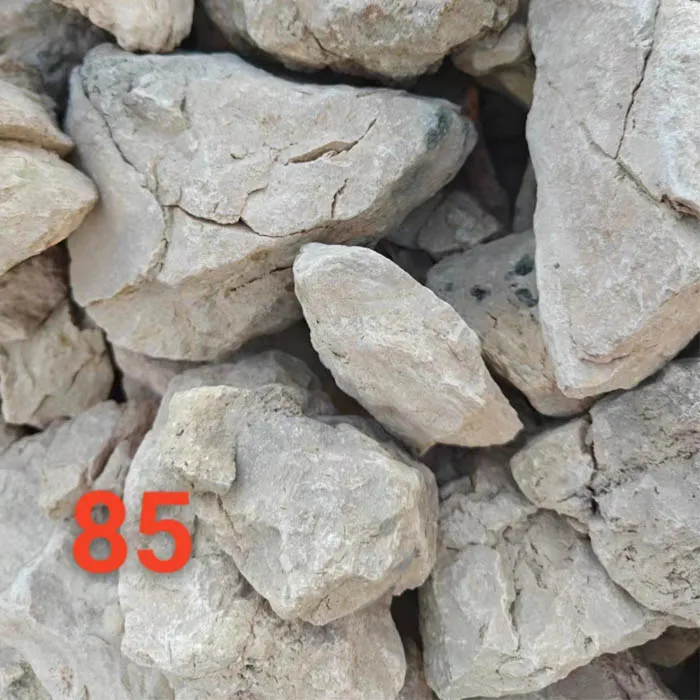மே . 22, 2025 14:02 மீண்டும் பட்டியலில்
Bauxite: The Essential Ore Powering Industry and Innovation
பாக்சைட் is the world's primary source of aluminum—a versatile and lightweight metal used in everything from construction and aerospace to consumer electronics and food packaging. Extracted from the earth in specific regions known as bauxite mines, this ore plays a vital role in global supply chains and industrial advancement. With increasing demand for sustainable resources, understanding the significance of bauxite and how it is sourced and utilized becomes more important than ever.

What Is Bauxite?
பாக்சைட் is a naturally occurring, heterogeneous rock composed mainly of aluminum hydroxide minerals such as gibbsite, boehmite, and diaspore. It also contains varying amounts of iron oxides, clay minerals, and silica. It is not a mineral itself, but rather an ore from which aluminum is extracted through the Bayer Process.
There are three primary types of bauxite based on mineral composition:
Gibbsite Bauxite (Al(OH)₃): Found in most major bauxite deposits and preferred for refining due to its lower energy requirements.
Boehmite Bauxite (γ-AlO(OH)): Requires more energy to refine.
Diaspore Bauxite (α-AlO(OH)): Also energy-intensive, often found in Chinese deposits.
Bauxite Mines: Where and How Bauxite Is Extracted
A bauxite mine is an open-pit or strip mine where bauxite is extracted from the earth’s crust. These mines are typically located in tropical and subtropical regions with abundant rainfall and favorable geological conditions. Some of the world’s largest bauxite mines are in:
Australia (the world’s top producer)
Guinea
Brazil
India
Indonesia
Mining begins by clearing the overburden (surface vegetation and soil), followed by drilling, blasting, and hauling the bauxite to processing facilities. Reclamation is often required post-mining to restore land usability and biodiversity.
Efforts are being made globally to make bauxite mines more environmentally responsible by:
Reducing dust and emissions
Managing water responsibly
Rehabilitating mined land
Engaging with local communities
The Bayer Process: Turning Bauxite into Aluminum
After bauxite is mined, it undergoes the Bayer Process to extract alumina (aluminum oxide), which is then used in the Hall-Héroult process to produce aluminum metal. The Bayer Process includes:
Crushing and Grinding: The bauxite is crushed into a fine powder.
Digestion: It is mixed with sodium hydroxide and heated under pressure, dissolving the aluminum-containing compounds.
Clarification: Insoluble residues (red mud) are separated.
Precipitation: Aluminum hydroxide is precipitated out.
Calcination: The hydroxide is heated to produce alumina.
Bauxite in Gaming: What Is Satisfactory Bauxite?
If you're a fan of factory-building simulation games, you’ve probably heard of Satisfactory bauxite. In the game Satisfactory, bauxite is a raw resource used to produce aluminum ingots. Players must locate bauxite nodes, mine the ore, and process it through a series of machines to create advanced materials used for higher-tier structures and items.
In-game, Satisfactory bauxite is often found in specific biomes, such as:
The Eastern Dune Forest
Red Jungle (Crater Lakes area)
Northern Forest cliffs
Managing Satisfactory bauxite resources effectively is crucial for progressing in the game, especially for large-scale production of aluminum-based parts. The parallels between in-game logistics and real-world bauxite mine operations highlight the complexity of resource extraction and processing.
Why Bauxite Is Indispensable
The uses of bauxite extend far beyond aluminum production. Here are some of its major applications:
Aluminum Manufacturing: More than 90% of bauxite is refined into alumina for aluminum production.
Abrasives: Some forms of calcined bauxite are used in sandblasting and grinding tools.
Refractories: High-grade bauxite is used in refractory bricks for high-temperature furnaces.
Cement Production: Used as a raw material in certain cement blends.
Proppants: Used in oil and gas fracking to keep boreholes open.
Challenges and Opportunities in the Bauxite Industry
Environmental Concerns
Mining and refining bauxite can lead to:
Deforestation and habitat loss
Dust and air pollution
Red mud disposal issues
Addressing these concerns requires strict regulatory compliance and corporate responsibility.
Supply Chain Volatility
Bauxite mines are concentrated in a few countries, making the global aluminum supply susceptible to political instability, export bans, or natural disasters.
Technological Innovations
Modern technologies are making bauxite mining and alumina refining cleaner and more efficient. For example:
Dry stacking of red mud
Solar-powered refineries
Autonomous mining equipment
These advancements make the industry more sustainable and cost-efficient.
Future Outlook
As the demand for electric vehicles, renewable energy infrastructure, and lightweight materials continues to rise, the importance of bauxite will only increase. Innovations in recycling and processing will complement bauxite mine operations, allowing for more sustainable aluminum production.
In digital worlds like Satisfactory, players continue to explore how to optimize bauxite logistics, reflecting a growing appreciation for real-world resource complexity.
Bauxite FAQs
Q1: What is bauxite primarily used for?
A: பாக்சைட் is mainly used to produce alumina, which is then used to manufacture aluminum. Other uses include abrasives, refractories, and cement.
Q2: How is bauxite mined?
A: Most bauxite mines are open-pit operations. The ore is extracted using heavy machinery and transported to nearby refineries.
Q3: Is bauxite a renewable resource?
A: No, bauxite is a non-renewable resource, but it can be recycled indirectly through aluminum recycling.
Q4: What makes Satisfactory bauxite different from real-world bauxite?
A: In Satisfactory, bauxite is a game resource used for aluminum production in a simulated environment. While based on real-world processes, it's simplified for gameplay.
Q5: Which country has the largest bauxite reserves?
A: Guinea has the world’s largest known bauxite reserves, followed by Australia, Brazil, and Vietnam.
From the depths of the earth to the digital landscapes of simulation games, bauxite remains a cornerstone of modern development. Whether mined in a remote bauxite mine or extracted in a virtual factory in Satisfactory, its importance cannot be overstated. As the world continues to pursue lightweight, efficient, and sustainable materials, bauxite will remain at the center of industrial innovation and progress.
-
zonolite-vermiculite-historical-uses-in-construction
செய்திAug.22,2025
-
pink-bauxite-rarity-and-collector-value
செய்திAug.22,2025
-
heat-refractory-material-thermal-conductivity-characteristics
செய்திAug.22,2025
-
refractory-lining-material-selection-criteria
செய்திAug.22,2025
-
therm-o-rock-vermiculite-insulation-properties
செய்திAug.22,2025
-
bauxite-ar-in-modern-mining
செய்திAug.22,2025
